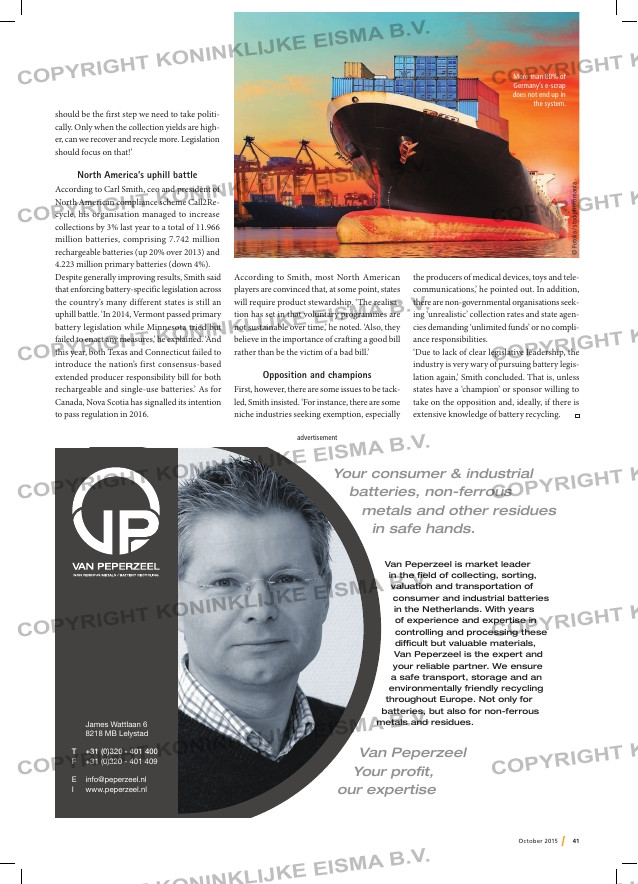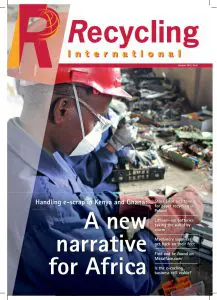Page 43 from: October 2015

41October 2015
Van Peperzeel is market leader
in the eld of collecting, sorting,
valuation and transportation of
consumer and industrial batteries
in the Netherlands. With years
of experience and expertise in
controlling and processing these
difcult but valuable materials,
Van Peperzeel is the expert and
your reliable partner. We ensure
a safe transport, storage and an
environmentally friendly recycling
throughout Europe. Not only for
batteries, but also for non-ferrous
metals and residues.
Your consumer & industrial
batteries, non-ferrous
metals and other residues
in safe hands.
Van Peperzeel
Your prot,
our expertise
James Wattlaan 6
8218 MB Lelystad
T +31 (0)320 – 401 400
F +31 (0)320 – 401 409
E [email protected]
I www.peperzeel.nl
should be the first step we need to take politi-
cally. Only when the collection yields are high-
er, can we recover and recycle more. Legislation
should focus on that!’
North America’s uphill battle
According to Carl Smith, ceo and president of
North American compliance scheme Call2Re-
cycle, his organisation managed to increase
collections by 3% last year to a total of 11.966
million batteries, comprising 7.742 million
rechargeable batteries (up 20% over 2013) and
4.223 million primary batteries (down 4%).
Despite generally improving results, Smith said
that enforcing battery-specific legislation across
the country’s many different states is still an
uphill battle. ‘In 2014, Vermont passed primary
battery legislation while Minnesota tried but
failed to enact any measures,’ he explained. ‘And
this year, both Texas and Connecticut failed to
introduce the nation’s first consensus-based
extended producer responsibility bill for both
rechargeable and single-use batteries.’ As for
Canada, Nova Scotia has signalled its intention
to pass regulation in 2016.
According to Smith, most North American
players are convinced that, at some point, states
will require product stewardship. ‘The realisa-
tion has set in that voluntary programmes are
not sustainable over time,’ he noted. ‘Also, they
believe in the importance of crafting a good bill
rather than be the victim of a bad bill.’
Opposition and champions
First, however, there are some issues to be tack-
led, Smith insisted. ‘For instance, there are some
niche industries seeking exemption, especially
the producers of medical devices, toys and tele-
communications,’ he pointed out. In addition,
there are non-governmental organisations seek-
ing ‘unrealistic’ collection rates and state agen-
cies demanding ‘unlimited funds’ or no compli-
ance responsibilities.
‘Due to lack of clear legislative leadership, the
industry is very wary of pursuing battery legis-
lation again,’ Smith concluded. That is, unless
states have a ‘champion’ or sponsor willing to
take on the opposition and, ideally, if there is
extensive knowledge of battery recycling.
More than 80% of
Germany’s e-scrap
does not end up in
the system.
advertisement
©
F
ot
ol
ia
/
st
oc
kp
ho
to
m
an
ia



